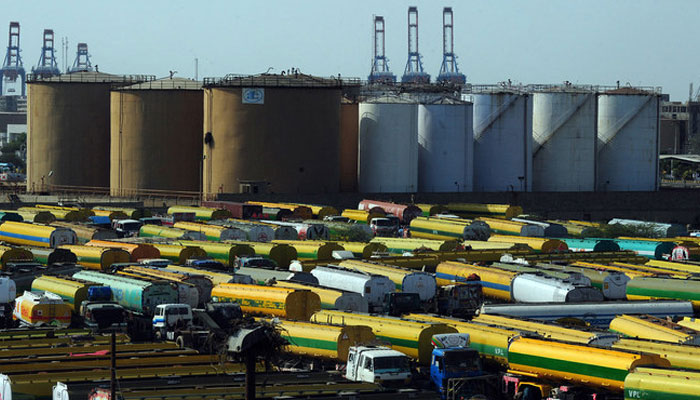Cnergyico gets green light to export 30,000 tonnes of furnace oil
KARACHI: The Oil and Gas Regulatory Authority (Ogra) has given permission to Cnergyico Pakistan Limited (CPL) to export 30,000 metric tonnes (MT) of furnace oil (FO).
CPL sought approval for the export late last month, citing an excess supply of furnace oil due to reduced local consumption. “CPL may proceed with the export of 30,000MT FO during the period from November 20, 2024 to December 10, 2024, from the Kemari Port only,” Ogra said in a letter addressed to the refinery.
Furnace oil exports from Pakistan have been ongoing throughout November, with Pak Arab Refinery Limited (Parco) initiating shipments earlier this month.
During the first four months of the current fiscal year, Pakistan exported a record 430,000MT of furnace oil as domestic demand for power generation plummeted. Monthly exports included 116,000MT in July, 66,500MT in August, 114,000MT in September, and 133,700MT in October.
Local refineries have turned to exporting furnace oil as its use in power plants has significantly declined. The government has deprioritised its use for electricity generation due to its high cost. Consequently, power generation from fuel oil dropped by 87 per cent during the first four months of the current fiscal year compared to the same period last year. In October, electricity generation from it was almost negligible.
Under the new refining policy, local refineries are set to drastically reduce furnace oil production. The policy aims to cut high-sulphur FO output by 78 per cent, from 15,500 tonnes per day to 3,400 tonnes per day. The focus is shifting towards producing cleaner fuels, including gasoline and diesel, which meet Euro-V standards.
However, the policy’s implementation faces challenges, particularly unresolved issues related to upgrade agreements. Refineries are demanding the removal of the sales tax exemption on petroleum products, but the government has yet to address this request. Upgraded facilities will aim to maximise gasoline and diesel production while minimising furnace oil output, aligning with environmental standards and modern energy needs.
-
 Kylie Kelce Reveals Rules She Wants Daughter Bennett To Learn At 3: No More 'passies'
Kylie Kelce Reveals Rules She Wants Daughter Bennett To Learn At 3: No More 'passies' -
 Smartphone Market Set For Biggest-ever Decline In 2026
Smartphone Market Set For Biggest-ever Decline In 2026 -
 Mud, Rain, Loincloths: All About Japan’s 200-year-old Harvest Wrestling Ritual
Mud, Rain, Loincloths: All About Japan’s 200-year-old Harvest Wrestling Ritual -
 Jonathan Majors Set To Make Explosive Comeback To Acting After 2023 Conviction
Jonathan Majors Set To Make Explosive Comeback To Acting After 2023 Conviction -
 Next James Bond: Why Jacob Elordi May Never Get 007 Role?
Next James Bond: Why Jacob Elordi May Never Get 007 Role? -
 Maddox Drops Pitt From Surname In Credits Of Angelina Jolie’s New Film 'Couture' Despite Truce From Father's End In Legal Battle
Maddox Drops Pitt From Surname In Credits Of Angelina Jolie’s New Film 'Couture' Despite Truce From Father's End In Legal Battle -
 Meghan Markle Adds Diamonds To Engagement Ring For Jordan Trip
Meghan Markle Adds Diamonds To Engagement Ring For Jordan Trip -
 Burger King Launches AI Chatbot To Track Employee Politeness
Burger King Launches AI Chatbot To Track Employee Politeness -
 Andrew’s Woes Amid King Charles’ Cancer Battle Triggers Harry Into Action For ‘stiff Upper Lip’ Type Dad
Andrew’s Woes Amid King Charles’ Cancer Battle Triggers Harry Into Action For ‘stiff Upper Lip’ Type Dad -
 Experts Warn Andrew’s Legal Troubles In UK Could Be Far From Over
Experts Warn Andrew’s Legal Troubles In UK Could Be Far From Over -
 Teyana Taylor Reflects On Dreams Turning Into Reality Amid Major Score
Teyana Taylor Reflects On Dreams Turning Into Reality Amid Major Score -
 Jennifer Garner Drops Parenting Truth Bomb On Teens With Kylie Kelce: 'They're Amazing'
Jennifer Garner Drops Parenting Truth Bomb On Teens With Kylie Kelce: 'They're Amazing' -
 AI Is Creating More Security Problems Than It Solves, Report Warns
AI Is Creating More Security Problems Than It Solves, Report Warns -
 'Game Of Thrones' Prequel 'A Knight Of The Seven Kingdoms' New Ratings Mark Huge Milestone
'Game Of Thrones' Prequel 'A Knight Of The Seven Kingdoms' New Ratings Mark Huge Milestone -
 Apple Seeks To Dismiss Fraud Suit Over Siri AI, Epic Injunction
Apple Seeks To Dismiss Fraud Suit Over Siri AI, Epic Injunction -
 Delroy Lindo Explains The Crucial Role Of Musical Arts In Setting Up His Career Trajectory
Delroy Lindo Explains The Crucial Role Of Musical Arts In Setting Up His Career Trajectory




